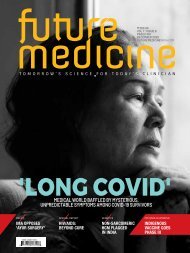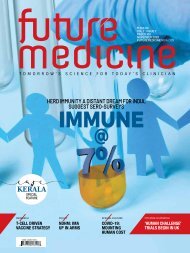Create successful ePaper yourself
Turn your PDF publications into a flip-book with our unique Google optimized e-Paper software.
intensive palliative care unit. To make<br />
matters worse, she developed Steven<br />
Johnsons syndrome, which is often a side<br />
effect of many anti-epileptic drugs. Steven<br />
Johnsons syndrome was treated via standard<br />
intravenous immunoglobulin. She was at her<br />
worst cognitive condition when the genetic<br />
test results arrived. The results indicated<br />
2 mutations in the carbamoyl-phosphate<br />
synthetase 2, aspartate transcarbamylase,<br />
and dihydroorotase (CAD) gene, indicative of<br />
early infantile epileptic encephalopathy-50.<br />
Early infantile epileptic encephalopathy-50<br />
is characterized by early-onset seizures<br />
and severe developmental regression as<br />
seen in Mallika. It is an autosomal recessive<br />
progressive neurodegenerative disorder<br />
EARLY INFANTILE EPILEPTIC<br />
ENCEPHALOPATHY-50 IS<br />
CHARACTERIZED BY EARLY-<br />
ONSET SEIZURES AND SEVERE<br />
DEVELOPMENTAL REGRESSION<br />
that occurs due to mutations in the CAD<br />
gene. The CAD gene encodes an enzyme<br />
required for the biosynthesis of pyrimidine<br />
nucleotides. Such a condition has been<br />
shown to be treatable by oral uridine.<br />
Uridine is not available in the Indian market<br />
and had to be bought through Amazon. Dr.<br />
Kulkarni reminisces that it took over a month<br />
to procure the drug, however, the effects<br />
were immediate. Within 48 hrs of starting<br />
oral uridine, Mallika’s seizures reduced and<br />
refractory status epilepticus was aborted.<br />
Today, Mallika is only on 2 antiepileptic<br />
drugs in addition to oral uridine, and while<br />
she is not yet cognitively normal, she is able<br />
to walk, and her speech is slowly recovering.<br />
Dr. Kulkarni would like to stress on the<br />
benefits of genetic testing, how this has<br />
revolutionized precision medicine for rare<br />
disorders, and how it is important to keep<br />
pursuing the right diagnosis to identify the<br />
right treatment options.<br />
DR SHIVANEE SHAH<br />
<strong>April</strong> <strong>2019</strong> / FUTURE MEDICINE / 49


















